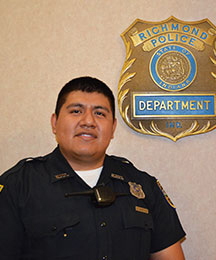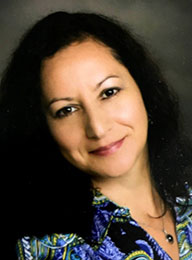Public invited to open discussion on Police Relationships with the Latino Community on March 23
Indiana University East will sponsor a forum at 7 p.m. on Wednesday, March 23, to focus on police relationships with the growing local Latino population. But the event also will explore a lot more involving the sense of community and the common good.
The forum, “Police Relationships with the Latino Community,” will be held at Morrisson-Reeves Library, 80 N. 6th St. in Richmond. The forum is free and open to the public.
“The focus is on inclusivity and participation in community life,” said IU East Campus Library Director Frances Yates, who helped organize the event. “The goal is to have an open and forthright discussion, with active participation from a large number of community members.”
The discussion is part of Latino Americans: 500 Years of History, a public programming initiative produced and funded by the National Endowment for the Humanities and the American Library Association.
Goals include offering education on histories and cultures and fostering understanding of local Latino American communities. The police relations program is part of a year-long series of events at IU East that includes films, art programs and talks by resident writers.
Assistant Professor of Criminal Justice Stephanie Whitehead will moderate the panel discussion. The event, like a lot of her work at IU East, involves this question: “How do we make things more inclusive in Richmond? I think that includes building a stronger spirit of community for everyone,” she said.
There definitely are negative issues between local policing and Latinos, but a lot can be laid at the feet of miscommunications, she said.
“The language barrier creates that space where you can make a lot of assumptions,” Whitehead said.
That can result in overreacting to the seriousness of situations and becoming accusatory, rather than accommodating.
For example, says Latino community advocate and panel member Pamela (Zelaya) Hancock, a traffic stop or domestic disturbance can quickly become more escalated when each party doesn’t understand the other. Hancock is also the founder of Paz en Casa.
“Sometimes, they are going in assuming that everybody hates them,” Whitehead says. “The police feel like they are under attack. If they don’t feel like the community supports them, that creates problems,” Hancock said.
Conversely, problems are also caused when minority citizens feel like they are stereotyped and picked on – or are secretive or silent on issues.
They often are fearful to speak up because they think it’s better not to draw notice to themselves or their families in times when immigration issues are under a political microscope.
“There’s this idea of a Latino community, but we don’t hear from the Latino community,” Whitehead said.
She will talk about statistics on racial disparities in policing, health care and education. It’s not easy getting those statistics. “We hear anecdotally about issues, but it’s having data to support it that is a problem.”
She is thrilled that one of her former students, Richmond Police Officer Sergio Santiago, will serve on the panel.
The IU East and Richmond High School graduate was one of the first two students to go through the cadet program at IU East that started in the 2012-13 school year. He will discuss his experiences as a police officer and as a resident.
Hancock works with Wayne County Health and with various organizations to provide better access to education and health care. She sees some big gulfs in communications across a lot of daily living situations.
The issues are gaining importance because the Latino population in Richmond “is growing exponentially,” Hancock said. “The majority of new immigrants are under 40 years old and having children.”
Often, the children may have to serve as an interpreter for their own parents. That may work for everyday situations, but doesn’t work well with legal or medical issues, Hancock said.
Some of the biggest needs in the Latino community are transportation, translation services and quicker help for victims of abuse, she said.
Whitehead praises Hancock for her efforts to get the word out about the event in the Latino community.
“Pam has been the front-runner of trying to get people there,” Whitehead said. “We want to give a voice to these issues.”




